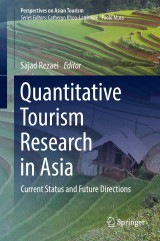Details

Quantitative Tourism Research in Asia
Current Status and Future DirectionsPerspectives on Asian Tourism
|
171,19 € |
|
| Verlag: | Springer |
| Format: | |
| Veröffentl.: | 14.12.2018 |
| ISBN/EAN: | 9789811324635 |
| Sprache: | englisch |
Dieses eBook enthält ein Wasserzeichen.
Beschreibungen
<p>The purpose of this book is twofold. First, this book is an attempt to map the state of quantitative research in Asian tourism and hospitality context and provide a detailed description of the design, implementation, application, and challenges of quantitative methods in tourism in Asia. Second, this book aims to contribute to the tourism literature by discussing the past, current and future quantitative data analysis methods.</p><p>The book offers new insights into well-established research techniques such as regression analysis, but goes beyond first generation data analysis techniques to introduce methods seldom – if ever – used in tourism and hospitality research. In addition to investigating existing and novel research techniques, the book suggests areas for future studies. In order to achieve its objectives the analysis is split into three main sections: understanding the tourism industry in Asia; the current status of quantitative data analysis; and future directions for Asian tourism research.</p>
<div>1. Quantitative methods, applications, and trends in Asian tourism research.- Part 1. Understanding Tourism Industry in Asia.- 2. Systematic reviews in Asia – Introducing the “PRISMA” protocol to tourism and hospitality scholars.- 3. The relationship between tourism industry and economic growth: A Panel Data Analysis for ASEAN member countries.- 4.Hospitality Competitiveness Index for Indian States & Union Territories using Multi-Criteria TOPSIS.- 5. Co-integration and causality analysis between tourism sector and GDP in Cambodia.- Part 2. Current Trends and Applications. 6. Regression Analysis with Dummy Variables: Innovation and Firm Performance in the Tourism Industry.- 7. Quantitative Dimension of India’s Tourism Trajectory in the Post-Reform Era.- 8. A Quantitative Analysis of Intercultural Communication and Personality: The Case of Coffee Shop Consumers in Cambodia.- 9. Structural Equation Modelling with Path Analysis: Antecedentsof Corporate Commitment to Sustainable Tourism.- 10. Partial Least Squares Structural Equation Modeling in Asian Tourism and Hospitality Research – A Systematic Review.- 11. Structural Equation Modelling with Second-order Confirmatory Factor Analysis: Critical Factors Influencing Consumer Behavior in Medical Tourism.- Part 3. Future Directions. 12. Positive and Negative Perceptions of Residents toward Tourism Development: Formative or Reflective.- 13. Vector Autoregressive Models with Multivariate Time Series: Spillovers of International Tourist Arrivals on a Local Economy.- 14. Beyond structural equation modelling in tourism research: fuzzy set/Qualitative Comparative Analysis (fs/QCA) and Data Envelopment Analysis (DEA).- 15. Ethical Considerations in Quantitative Research: A Guide for Tourism and Hospitality Researches.</div>
<div><p>Dr. Sajad Rezaei currently works at the School of Business, Economics and Social Sciences, University of Hamburg. He teaches Quantitative Research Methods and International Market Strategies-postgraduate level. Previously, he worked as a Lecturer at Taylor’s University (Malaysia) dual award programs with the Bristol Business School, University of the West of England (UWE), UK. His recent research has been published in refereed journals such as <i>Journal of Business Research</i>, <i>International Journal of Contemporary Hospitality Management, Journal of Travel & Tourism Marketing, Tourism and Hospitality Research, Journal of Hospitality and Tourism Technology, Current Issues in Tourism, </i><i>Computers in Human Behavior</i>, <i>Journal of Retailing and</i> <i>Consumer Services</i><i>, Marketing Intelligence & Planning, Journal of Internet Commerce</i>, <i>Technology Analysis & Strategic Management, </i><i>The International Review of Retail, Distribution and Consumer Research</i>, and <i>International Journal of Retail & Distribution Management</i><i>, </i>among others scholarly outlets. His research direction has extended from his background in BSc Business Administration, MBA dissertation and PhD. theses with two key research themes including e-commerce and consumer behavior. He serves as a reviewer for several refereed journals and a member of Editorial Advisory Board for <i>Journal of Hospitality and Tourism Insights</i>, <i>Journal of Promotion Management</i> and <i>International Journal of Electronic Marketing and Retailing</i> among others.<i></i></p></div>
<p>The purpose of this book is twofold. First, this book is an attempt to map the state of quantitative research in Asian tourism and hospitality context and provide a detailed description of the design, implementation, application, and challenges of quantitative methods in tourism in Asia. Second, this book aims to contribute to the tourism literature by discussing the past, current and future quantitative data analysis methods.</p><p>The book offers new insights into well-established research techniques such as regression analysis, but goes beyond first generation data analysis techniques to introduce methods seldom – if ever – used in tourism and hospitality research. In addition to investigating existing and novel research techniques, the book suggests areas for future studies. In order to achieve its objectives the analysis is split into three main sections: understanding the tourism industry in Asia; the current status of quantitative data analysis; and future directions for Asian tourism research.</p>
Provides an overview of current issues and challenges in applying quantitative data analysis methods in Asian tourism research Offers a non-technical guideline for tourism researchers who are interested in data analysis methods Introduces powerful research methods seldom if ever used in tourism research
<br>
Diese Produkte könnten Sie auch interessieren:

A Sea Change: The Exclusive Economic Zone and Governance Institutions for Living Marine Resources

von: Syma A. Ebbin, Alf H. Hoel, Are Sydnes

96,29 €















